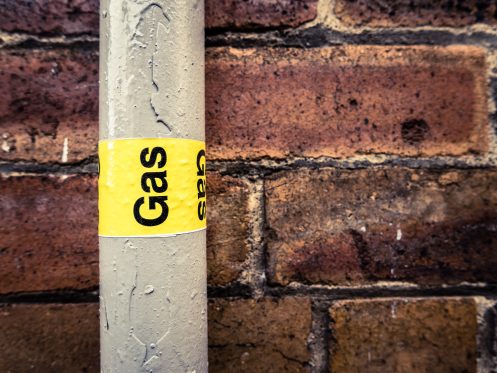Gas leaks can be dangerous, and there are a lot of ways that they can occur in the summer. Not only can gas leaks cause fires, but gas is also very toxic when inhaled, potentially causing headaches, nausea, difficulties with concentration and memory, and even loss of consciousness and suffocation. There are a lot of ways that gas leaks can happen, and summertime, with all of its activities, is prime time for accidental gas leaks. The following are some of the top ways that a gas leak could occur and how you can try to avoid them.
Don’t Tie Up Your Dog to the Gas Meter or Line
When you have to go inside quickly to grab something from inside the house and need a place to tie up your pet, it can be tempting to tether them to the closest thing. But even though the gas line and meter are made of metal, that doesn’t mean that your dog isn’t strong enough to cause damage to the line, especially if you’re in the habit of tying them up in the same place. Instead, tie your dog up to a running line if you want them in your backyard but don’t have a fence to keep them in. Not only will this prevent the gas line from being pulled out, but it’s also more humane for your dog because they can run freely during that time.
Be Careful When Using the Lawn Mower or Weedwacker
When you’re trying to clean up your yard, it can be tempting to get the mower or weedwacker as close to the gas lines as possible, but you need to be aware that it’s possible to damage the lines if you ram your mower into them. And if the blades of your lawn mower hit the gas meter or lines, it’s especially likely that you could create a gas leak. To avoid bigger problems, another option is to get out the garden shears and go around the meter by hand to avoid damaging the meter or line.
Signs That You Have a Gas Leak
If you damage your meter or one of the gas lines, you might be able to visually see this, but it’s not always the case. Another sign that you should look out for is the smell of rotting eggs, which is what gas can smell like. If the vegetation around your gas line or meter is dying when other plants that are farther away look fine, there’s a good chance that natural gas is killing those plants closer to the meter. The soil around the area might also be discolored. And if you hear a whistling sound or another loud noise coming from your meter, leave the area right away, as this is a sign that gas is escaping from your meter or line.
How to Avoid Hitting a Gas Line When Digging In the Yard
One of the most important parts of digging is making sure that you know where the gas lines are located and how far away you need to stay away from them. If you have a professional digging in your yard, such as when you’re having work done on your septic system, they should automatically ask the utility company to mark the lines. But if you’re planning on doing any digging on your own, it’s imperative that you use the 811 service. They’ll come to your property and mark the lines for free so that you can dig without fear of hitting one of the lines. Once you know where the lines are, you should know that you need to stay at least 18 inches away from them, as the lines are approximations. And if you’re trying to pull up shrubs near the lines, understand that roots can easily grow around the lines, so you need to be especially careful to not pull at the shrub in a way that will pull at the line as well.
Gas Leaks Inside the Home
There are a number of places where you could notice a gas leak inside your home if you use gas to heat appliances. For instance, you might notice a gas leak around the water heater, or if you have a gas stove and oven, you could have a gas leak from the oven or the line that runs to the oven. There are a number of reasons that you could get a gas leak inside of your house. For instance, you might have a fitting between the gas line and appliance that has degraded over time or was never fitted well to begin with. Gas line installation isn’t something that should ever be left to someone who doesn’t have extensive training in it. In fact, there’s an entire branch of plumbing that’s dedicated to gas line installation because it requires specialized knowledge. Additionally, it’s possible to have an appliance malfunction because it wasn’t properly maintained or simply malfunctioned for another reason. Most appliances will function well for years after they were initially purchased, but with all things, it’s always possible for there to be a design flaw or a single appliance that was improperly constructed.
If you want to avoid gas leaks inside the home, there are a number of steps that you should take. First of all, make sure that you always have appliances installed correctly by having a qualified plumber install it. You should also have your appliances regularly maintained to ensure that the connection between the gas line and the appliance is still in good condition and that the appliance itself is still working properly. A master plumber should periodically check for wearing on the appliance as well.
What to Do if You Suspect a Gas Leak
If you think that you’ve hit a gas line, one of the first things that you should do is leave the area so that you’re not poisoned by breathing it in. Additionally, make sure any pets or other people who may be in or around the house are out of the area. If there’s anything burning or hot in the area, be sure to extinguish it right away, too. Then, call 911 and your utility emergency number so that someone can go to your house right away to address the issue and turn off the gas to your home.
Gas leaks are serious business, so you need to know what to do in the event of an emergency. But you also need to rely on an experienced plumber to help you avoid gas leaks outside in the summer and indoors all year. Whenever you’re looking for a company that can help to keep your home safe and running at peak performance, look to On Time Experts. We offer a variety of services throughout Garland, including HVAC and plumbing repairs, installations, and maintenance services. We have an A+ rating with the Better Business Bureau, we’re exclusively endorsed by the Consumer Team, and we have NATE-certified technicians. Give us a call today to learn more or schedule an appointment.

